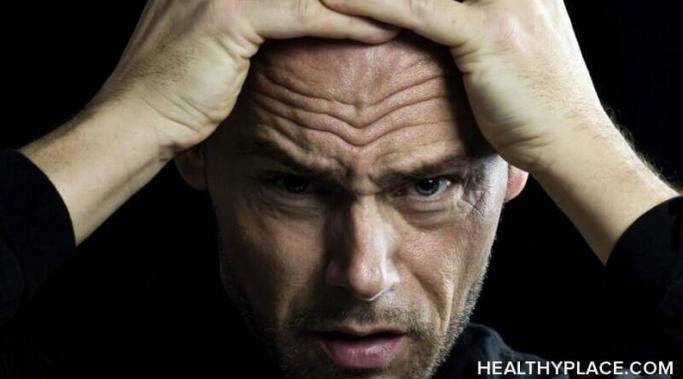Blogs
People with dissociative identity disorder (DID) often experience recurring grief. This grief is not always connected to physical loss and death. It can also be connected to symbolic loss, a type of loss commonly experienced by trauma survivors. This type of loss can have profound, lasting effects. For a person with DID experiencing grief because of symbolic loss, the entire system can be affected, complicating the grieving process even more.
The government can help people with mental health issues. I am on Social Security Disability Insurance (SSDI) and Supplemental Security Income (SSI) and run a small freelance writing business (How To Get Disability Benefits For Mental Illness). Until recently, I could not get insurance because of my schizophrenia being a pre-existing condition, which forced me to stay on disability so I could get Medicare and Medicaid so I wouldn't be wiped out again if I were hospitalized. This meant I had to watch my income. So I have plenty of ideas about how the government can help people with mental health issues.
Some teetotalers abstain from alcohol because the have a family history of alcoholism. Gillian Jacobs, Hal Sparks, and Joe Biden are a few famous names that attribute their sobriety to teetotaling because of a family history of alcoholism.
Mental illness stigma and when to be honest in a relationship is tricky business. Being in a relationship when you have a mental illness can often make the difference between feeling good about yourself and feeling as though life has no meaning. Unfortunately, sometimes being honest about mental illness in a relationships causes people who believe in the stigma to leave.
Negative people are everywhere and negative people can harm your confidence dramatically. If we aren't careful, their negativity can rub off on us leading to self-esteem issues, unhappiness and lower self-confidence. We can't avoid all the negative people and energy that come into our lives but we can take measures to stay aware and positive. Don't let those negative people harm your confidence.
Coping with feeling overwhelmed while in recovery from posttraumatic stress disorder (PTSD) can be challenging. I know when I become overwhelmed with anything--emotional, physical, or mental--I am likely to just want to shut down and avoid life. My anxiety kicks in and it feels like everything is out of control, moving too fast, and I become irritable, whiny, and tired. Sometimes when that happens, I absolutely need a full-stop (a nap or a good night's sleep) to recharge and feel better. But more often, I'm able to use coping skills that I have learned in PTSD recovery to deal with feeling overwhelmed (What's Your PTSD Recovery Program?).
Stress and mental illness is difficult to deal with for everyone, but possibly more so for those of us with schizophrenia or schizoaffective disorder. For those of us who do live with these disorders, stress can escalate other schizoaffective disorder symptoms that increase anxiety. This is what it’s like to live with stress when you have schizophrenia or schizoaffective disorder.
Anxiety has many different moods; frustratingly, anxiety isn’t a single, simple concept. No one can count on it to be anything other than disruptive and erratic. Perhaps you’ve experienced an all-too-common situation. You’re working hard to manage anxiety. Your anxiety symptoms have lessened and your life feels less restricted. Then, seemingly without warning, bam. Anxiety strikes again, and this time it feels worse somehow. This is a normal experience for people living with anxiety because anxiety has different moods. What are the different moods of anxiety and how can you tame them?
People with borderline personality disorder (BPD) often have issues with abandonment (Common Borderline Personality Disorder Symptoms). Last week I terminated therapy with my therapist. I struggled with the decision, as I know that those of us with BPD sometimes blame others for our emotional pain. Therapists are frequently used, in acute stages of BPD, as the reason for all of our emotions, both pleasant and unpleasant. This can bring up abandonment issues for those with BPD.
Sometimes unusual coping skills for depression work. There are some days that my depression symptoms are too stubborn to cooperate with my typical coping methods, so I have to get creative. Dancing, focusing on tactile experiences like snuggling in a soft blanket, running my hands through cool materials, and cooking have all proven to pull me through the especially testy days. Curious as to what others do to get through their stubborn days, I looked around and found that a ton of people recommend making art, meditating, practicing yoga, playing video games, and masturbating. These might be unusual coping skills for depression, but that doesn't mean they might not work for you.









I believe she will only be able to rid herself of her demons, and hopefully her BPD as well, when she's ready to confront the abuse of her father. If she can put the blame where it belongs, she may stop projecting that victim/perpetrator cycle on the present men in her life. These demons are a metaphor for the purgatory she has created for herself. That reality has consequences in the real world, but it need not be real in the tangible sense. Exorcising her demons will require the expenditure of real physical energy and probably the destruction of aspects of her personality. If this ever happens, and it's possible but not probable, then these demons will evaporate. They are only as real as one's personality is real. In short, reality is not the question, it's what you make of the things you feel to be real.